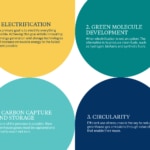"Solving the decarbonization puzzle"
Nearly a decade has passed since the signing of the historic Paris Agreement; a binding treaty that brought 195 countries together with a common goal: to slow the progression of climate change. The signatories committed to take the necessary steps to keep the Earth’s global temperature below 1.5˚C compared to pre-industrial levels. To this end, cutting CO2 emissions by approximately 45% from 2019 emission levels by 2030 was considered necessary as a preliminary step toward reaching net zero by 2050. One of the most significant challenges humanity has ever faced.

Aware of the consequences of inaction, 21st Century societies have accelerated the transition in recent decades, primarily through the rapid expansion of renewable energy. While it is true that a substantial number of green technologies have been established, reducing emissions in various sectors, considering that time is against us, is not sufficient. Developing and consolidating emerging clean technologies (cleantech) that can expedite emission reduction is essential to solving the decarbonization puzzle.
The good news is that this is an unstoppable transformation. Although we are entering a period marked globally by an increasing fragmentation and uncertainty, the clean technology revolution is going to be a great opportunity and a key leverage for the competitiveness of companies. Investment in both innovation and the massive deployment of cleantech will have an increasingly economic meaning. In the case of Spain and Europe, and in order to accelerate this opportunity for companies, it is essential to promote an investment-friendly environment marked by a radical simplification and an acceleration of bureaucracy, the promotion of public-private mechanisms for mitigating investment risks, and foreseeable industrial policies with clear demand signals.
In this publication, we aim to put the spotlight on some of these emerging technologies. While some may be somewhat unknown, they will be vital in the path to net zero. We are focusing on leading clean technologies that can be classified into four progressive categories: electrification, green molecule development, circularity and carbon capture and storage.

All of these technological innovations also represent attractive economic opportunities. According to the International Energy Agency’s Energy Technology Perspectives report (2023), the clean technologies market could triple in the transition toward a low-carbon economy, reaching $650 billion annually by 2030.
Due to the cross-cutting nature of various sectors and the global reach of cleantech, investment in this field will be one of the most significant in decades. There is no doubt that the opportunities that arise from the challenges of the decarbonization age come with a wave of optimism that gives the momentum needed to reach the net zero goal successfully.
